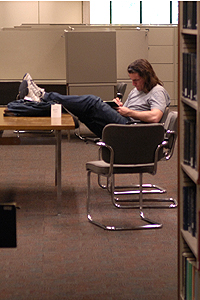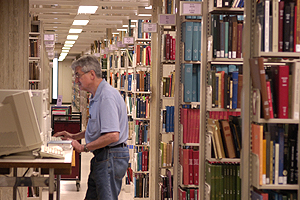A new library survey supports expanding space for knowledge
By Kim DixonNews Office
 A new survey on the library usage habits of students indicates electronic resources are not overtaking conventional methods of library research.   | |
A new student survey backs the hunch of University faculty and administrators that the demise of the book has been vastly overstated.
The poll of 5,700 students’ library usage habits on campus reveals the use of electronic resources is not crowding out use of libraries for research using conventional stacks, reference materials and other physical resources, as some have feared.
The University’s planned $42 million expansion of the Joseph Regenstein Library goes against the grain of its peer institutions by exponentially adding space on campus for books—3.5 million volumes.
The poll findings will be presented Thursday, Nov. 17, in a conference titled “Space and Knowledge,” which will explore the use of libraries on campus—the latest step in the creation of one of the most voluminous collections of library resources under one roof in the United States.
“These things are synergistic: we found if you are taking out lots of books, you are also more likely to be a high user of electronic resources,” said Andrew Abbott, the Gustavus F. and Ann M. Swift Distinguished Service Professor in Sociology and the College, who chairs the faculty task force on libraries.
The conference also will provide a forum for library staff, faculty, students and other interested parties to share their views on the project.
“It is a chance for us to rethink library functions and space,” according to Judith Nadler, Director of the University Library. “It will be a look at libraries past, present and future.”
The addition, which the Board of Trustees approved in May, will be located just west of the existing building. Automatic shelving systems will retrieve books from high-density shelves within minutes.
Many universities across the country are scaling back on book buying in favor of beefing up digital resources. But the poll findings suggest that “there is no real evidence of substitution,” Abbott said. “Users do seem to be using on-line rather than physical journals. But usage of other physical materials is up, and the survey tells us very clearly that heavy digital media users are heavy physical media users and vice versa.”
Abbott plans to eventually publish the findings of the survey in a scholarly journal.
Students were asked a range of questions including: Which library on campus do you prefer? Do you tend to work in groups or individually? Do you use library resources or bring your own study materials? How often do you use the library to nap?
Out of the 14,000 undergraduate and graduate students sent the surveys, an impressive 5,700 responded in full.
Five architectural firms are vying to design the expansion, and members of the architectural selection committee are expected to make a recommendation to the Board of Trustees within a few months.
Several faculty members will address the participants at Space and Knowledge, including Neil Harris, the Preston & Sterling Morton Professor of American History and the College; Geoffrey Freeman, principal of the architectural and planning firm Shepley, Bulfinch, Richardson and Abbott; and James Neal, vice president for information services and university librarian at Columbia University.
Richard Saller, Provost of the University, will deliver closing remarks at the conference, which is open to the public.
![[Chronicle]](/images/sidebar_header_oct06.gif)